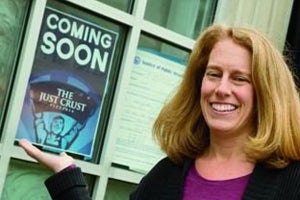On May 30th, The Just Crust, a new pizza restaurant pioneered by Shannon Liss-Riordan ’96, opened its doors for business. Although lawyers might scarf down a lot of pizza while working late nights, they don’t often sell it. But Liss-Riordan is doing just that from a Harvard Square pizzeria, where she is hoping to turn an infamous case accusing a pizza chain of stealing workers’ wages into an example of how giving employees a voice can be both fulfilling and profitable.
A partner at Boston-based plaintiffs’-side employment and labor law firm Lichten & Liss-Riordan, she opened The Just Crust pizzeria on Brattle Street in Cambridge, just down the block from where she lived with her now husband, Kevin, while she was in law school.
The Just Crust occupies a space once owned by The Upper Crust Pizzeria, a chain targeted by Liss-Riordan in a class-action lawsuit she described as the most egregious case she’s ever worked on. The suit accused the company of forcing employees to pay back $340,000 in back wages that the U.S. Department of Labor had required the chain to pay after a 2009 investigation. According to the lawsuit, upper-level managers told employees they would have to give back the money or lose their jobs.
When The Upper Crust filed for bankruptcy last fall, it sparked an idea for Liss-Riordan. She began searching for a buyer who would treat workers fairly. In November, however, the trustee who had taken over the chain suddenly shut it down, leaving 140 people without jobs. After her attempts to find an investor on short notice failed, she and her husband bought the Harvard Square location themselves.
Their plan is to hire back as many Upper Crust employees as possible and to give them an ownership share in the restaurant—an experiment that Liss-Riordan hopes will provide an example of how giving employees a voice will help companies thrive.
Liss-Riordan’s own firm has specialized in going after companies she claims have handed off the cost of running a business to employees by cheating them out of wages and earned tips.
In addition to Upper Crust employees, she has represented workers in the restaurant, hotel, and food service industries in cases involving tips and overtime pay, employees who allege they have been mischaracterized as independent contractors, and workers who claim that their employers have charged them for the right to work. Such cases have included commercial cleaners who pay up to $30,000 to get access to cleaning jobs they claim never materialized, strippers forced to pay shift fees to rent out poles, and truck drivers who have to buy or lease their own trucks.
In November, the 1st Circuit also affirmed on appeal a $14 million judgment Liss-Riordan won on behalf of nearly 15,000 Starbucks baristas in Massachusetts who accused the coffee chain of breaking a Massachusetts law prohibiting managers from dipping into waitstaff tip pools.
Having fought for so long on behalf of employees, Liss-Riordan is excited to see how a business can operate from an employer’s perspective and hopes that The Just Crust will successfully prove that worker-owned businesses can function in other industries as well. If pizzas prove to be successful, the next step might involve a worker-owned cleaning business.
“I thought that putting my legal skills to use on behalf of employees was an important thing I could do with my legal education and training to balance the scales of justice toward employees, because employers have so much more power,” Liss-Riordan said. “I hope this little experiment shows that you can turn that all around when you give the workers a voice.”
